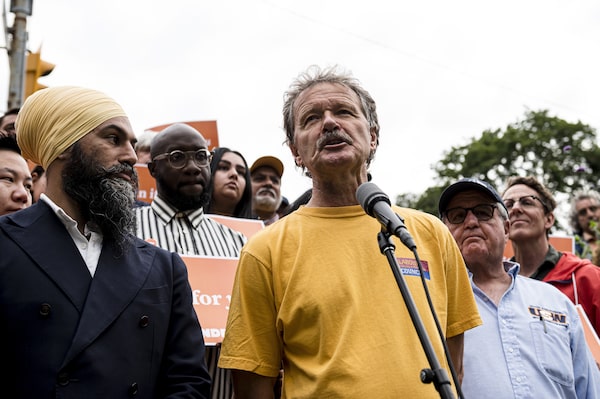
John Cartwright, President of the Toronto & York Region Labour Council, speaks in Toronto on Sept. 2, 2019.Christopher Katsarov/The Canadian Press
Union activists who for decades have marched through the streets of Canadian cities on Labour Day to celebrate workers’ rights will commemorate the event differently this year as the COVID-19 pandemic continues to put the brakes on mass gatherings.
John Cartwright is among those whose plans were dashed by public health measures meant to slow the spread of the novel coronavirus. The president of the Toronto and York Region Labour Council said he has been taking part in Labour Day marches for 40 years.
“This is the first time in 140 years that we will not be taking to the streets in the city of Toronto,” Cartwright said in an interview. “Not to be there physically is a heartbreak. I have been marching in that parade for decades.”
Cartwright said his council, which represents more than 220,000 people who work in every sector of the economy, decided that health and safety was its first priority and made the “difficult” decision to cancel this year’s festivities.
However, he said they have come up with alternative measures to ensure that workers’ rights are celebrated, with a virtual parade that will air on YouTube and Facebook.
The event, whose theme is “A Just Recovery for All,” will also feature videos from past parades and community contributions, as well as showcasing transit ads in support of front-line workers.
“Because we won’t be on the streets, we’re taking that message into the streets. We purchased 150 ads on buses across the Toronto and York Region, with images of front-line workers from grocery workers to health-care professionals,” Cartwright said.
Derek Johnstone, of United Food and Commercial Workers Canada, said COVID-19 had proven to be a game-changer in the way unions advocate for themselves.
He said it has also shone a light on how important the work of their members is – especially those who work in jobs within grocery stores, meat plants, nursing homes and more.
“It has affected the way we represent members and help them organize and exercise their rights,” he said. “When the chips were down these were the folks who stepped up for us and kept food in our fridges and went to work every day. They need to be treated accordingly within the critical role they play in society.”
Johnstone said his union is also finding ways to celebrate amid parade cancellations.
““There are a bunch of innovative things that folks are doing because they want to celebrate community,” he said. “We are not going to parade but Labour Day is still being celebrated the best we can in many different ways.”
UFCW said it will be participating in parade drive-ins, food drives, Facebook Live events and Zoom panels to discuss worker issues.
As some unions plan to celebrate, others will be protesting.
Roughly 1,400 members of Unifor Local 597, who work for Loblaw Co. at grocery stores in Newfoundland, are on strike demanding higher wages. The workers at 11 Dominion grocery stores have been on the picket lines for two weeks demanding higher wages, full-time positions and access to benefits.
Unifor national president Jerry Dias said such front-line workers are underpaid and have been treated poorly by employers.
“On Labour Day we will be picketing and demonstrating,” he said, noting that Newfoundland and Labrador “has one of the lowest minimum wages in the country” – $11.65 an hour as of April 1.
Unifor members across the country will be holding demonstrations in solidarity with the Dominion workers, with exact details to be announced Monday morning.
Dias said the holiday is not only a day of solidarity but a debate on essential workers’ rights.
“If you look at who we depended on during this pandemic, it was grocery workers, health-care workers and transit workers,” he said. “Our Labour Day is about supporting our members and raising the issue of incredible greed.”